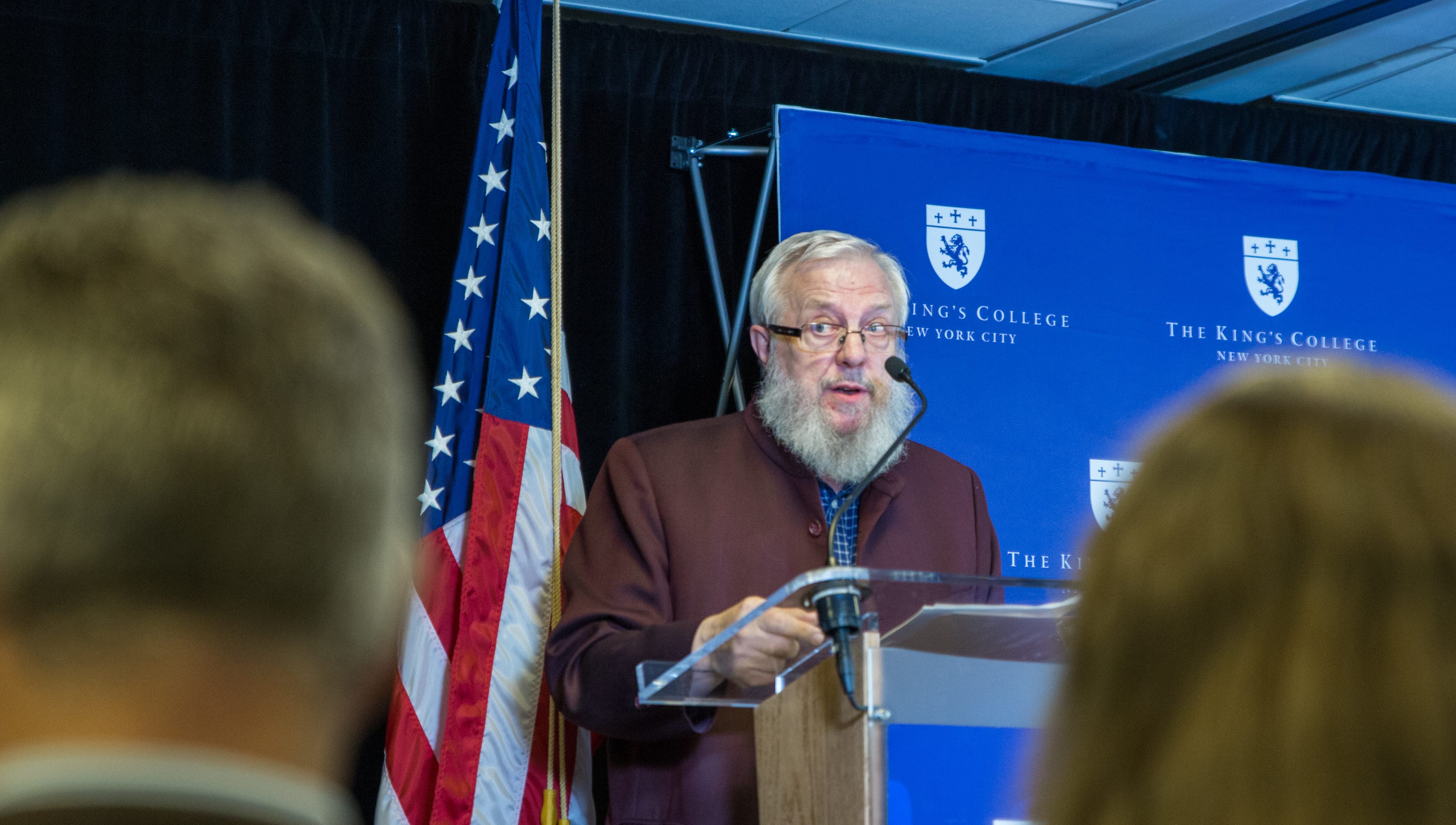‘Speak of the Devil?’: Dr. Billy Abraham Addresses Parents Weekend
On September 29, as part of Parents Weekend 2017, renowned Northern Irish theologian Dr. William J. Abraham delivered a lecture titled “Speak of the Devil?” before a standing room only audience of students, parents, alumni, faculty, and staff.

On September 29, as part of Parents Weekend 2017, renowned Northern Irish theologian Dr. William J. Abraham delivered a lecture titled “Speak of the Devil?” before a standing room only audience of students, parents, alumni, faculty, and staff on the 19th floor. Abraham is the Albert Cook Outler Professor of Wesley Studies at Southern Methodist University’s Perkins School of Theology. In the talk, Abraham provided reasons intelligent people should acknowledge demonic existence and argued that demonic activity is a profound opportunity for evangelism.
Abraham first presented the testimony of a secular theologian Thomas Altizer, whose ideas were the basis of the controversial 1966 “Is God Dead?” TIME issue. Altizer, a nominal Christian, described a demonic encounter as “perhaps the most ultimate experience” of his life: “I could feel Satan consuming me, absorbing me into his very being.”
What to make of this? Before revealing his own stance on demonic existence, Abraham delineated four ways of using demonic language: expressive, to renounce one’s enemies; prescriptive, to provoke hatred of other people; figurative, to speak dramatically about evil; and literal, to refer to invisible spiritual agents that oppose all things divine and can only be dispelled by a command in the name of Jesus.
WATCH: Dr. Billy Abraham’s talk at The King’s College
Abraham quoted a passage from English philosopher Sir Roger Scruton that further illustrates this literal sense of the demonic. In On Human Nature, Scruton distinguishes between those who are merely bad—flawed, ordinary people who can be reasoned with and accepted—and those who are evil:
There is, in them, no scope for improvement, no path to acceptance, and if we think of them as human, their faults are not of the normal, remedial, human variety but have another and more metaphysical origin. They are visitors from another sphere, incarnations of the Devil.
Scruton is a man who uses “theological” as an insult, Abraham said. But “even Scruton can’t avoid the language of the Devil.”
Gesturing to his own leprechaun- and fairy-filled Irish heritage, Abraham acknowledged it can be difficult to take claims about the Devil seriously. Yet if Scruton admits of “incarnations of the Devil,” the idea deserves a second thought.
There are recorded instances of the demonic across cultures, eras, and deep ideological divisions, Abraham said. These experiences cannot be chalked up to psychological disorders or mental illness. The list of demonic symptoms—insane hatred of holy objects, superhuman strength, facility in foreign languages, and at times knowledge beyond the capacity of the human agent—belongs in no psychological handbook. Indeed, when priests within the Catholic church perform exorcisms, they first conduct a psychiatric examination to ensure that the disorder is truly demonic in nature.
Ultimately, Abraham said, demonic experiences cannot be dismissed as mere superstition. To do so ignores the evidence at hand and betrays a “dogmatic assertion” that the only legitimate conclusions are the conclusions of science.
The Christian tradition, however, offers a rich framework for understanding demonic experiences that is “profoundly important for deeply disturbed people.” In the Christian theological tradition, the presence of demons is a symptom of a fallen world and a testament to the Power that can cast them out.
In the Q&A, Abraham related how he had become an atheist as a teenager. Realizing that he could conceive of the demonic brought about his eventual re-evangelization. “If you can conceive of the demonic, which is invisible, then you’re halfway to God. If demonic agency represents a bottom-level expression of possession of sin, the other side of that is nothing less than transfiguration,” Abraham said.
President Gregory Alan Thornbury said, “Dr. Billy Abraham is one of the most distinguished theologians in the country, and his willingness to ‘speak of the Devil’ as more than a metaphor should challenge each of us to recover our nerve. What an encouragement that even here, in this alien territory of the demonic, the resources of the Gospel offer clarity and hope.”




